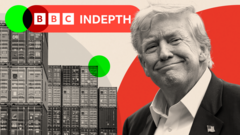The United States’ pursuit of global tariffs, often framed by its president as a strategic triumph, is increasingly viewed by economic analysts and international observers as a gamble with potentially profound and costly ramifications. While proponents highlight immediate concessions or perceived leverage, the long-term impact could trigger a fundamental restructuring of global trade alliances and economic partnerships, outcomes that might ultimately undermine the very objectives they were intended to achieve.
The imposition of tariffs by Washington has indeed prompted various responses from trading partners, ranging from negotiation to direct retaliation. This escalating cycle of protectionism threatens to disrupt established supply chains, inflate consumer prices, and reduce export competitiveness for American businesses. Industries reliant on globalized production, from manufacturing to technology, face heightened uncertainty and increased operational costs, challenging their ability to compete effectively in the world market.
Beyond immediate economic pressures, the greater concern lies in the potential for a foundational realignment of international economic order. If major trading blocs and nations, particularly those previously aligned with the US, begin to forge new agreements and shift their reliance away from American markets and goods, the long-term geopolitical and economic influence of the United States could diminish. This strategic pivot by other countries, driven by the desire for stability and diversified trade relationships, might lead to a fractured global economy where the US finds itself increasingly isolated or operating at a disadvantage.
The initial perceived “win” of tariffs, therefore, could evolve into a protracted struggle for market share and influence, demanding a high price not only from American consumers and producers but also from the nation’s standing in the intricate web of global commerce. The ultimate measure of success for this trade strategy may hinge less on short-term gains and more on its unforeseen consequences for the global economic landscape.



